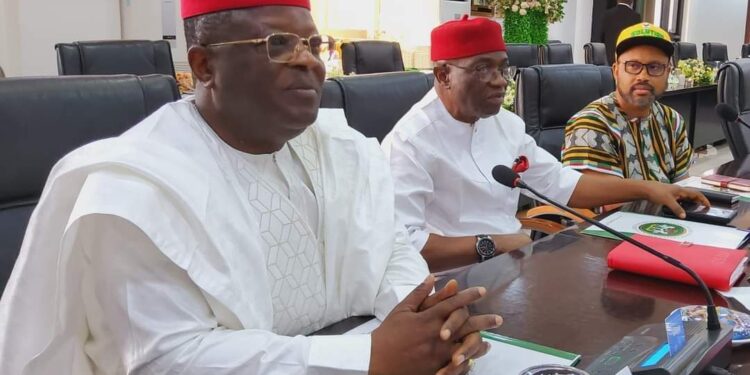ABUJA —The minister of Works, Sen Dave Umahi has asked the National Assembly to increase the ministry’s 2024 budget to about N1.5 trillion to enable it complete at least 10 selected critical roads and bridges in each of the six geo-political zones of Nigeria.
The minister also asked the Senate and House of Representatives committees on Works to equally support a review of all certified debts to contractors and if possible ,convert same to promissory notes to contractors to enable the ministry focus on using any funds appropriated to pursue the ministry’s set objectives .
Engineer Umahi who stated that out of N383,351,656,449.00 the sun of N184,351,147,332.29 which represents 48.01 percent of the capital allocation in the 2023 leaving a balance of N199,405,010,166.71 to be released, pointed out the need to encourage contractors to key into the Road Tax Credit Scheme to increase the number of private sector interventions .
The minister who appeared before the joint Senate and House of Representatives committees on Works further explained that the monies so far released was utilized for payments of some certified certificates for executed works on roads and bridges by Highway projects of engineering services and common services department .
He explained that as at November 2023 the ministry had an unpaid certificate in the sum of N1,507,873,365,616.02.
Engineer Unahi said the ministry had generated the sun of N723,063,678.62 from January to November 2023 and the sum remitted to the consolidated Revenue Account .
Speaking to the 2024 budget proposal of N657,228,251,596 the minister stated that part of the monies will be used to complete the Lagos-Ibadan expressway substantially completed about 90 percent .
The Abuja-Kaduna -kano road, Zaria-kano road,2nd Niger bridge although completed but needs Approach roads 2a And 2b already awarded awaiting funding will be included in the budget of 2024.
The minister further advised the lawmakers to consider a provision of an emergency fund of about 30 percent of the budget to carter for unforeseen emergencies that regularly occur on the road network especially during raining seasons.
Senator Adams Oshiomhole had challenged the minister and accused of abandoning his core mandate of road construction and delving into road maintenance which is the core mandate of FERMA.
Lawmakers also queried the wisdom in splitting contract sums instead of allocating reasonable monies that will complete big and important projects.
According to Oshiomhole, “the behaviour of the Ministry of works contradicts the renewed agenda of the current administration .
“We have passed resolutions in the Senate about the state of the roads and what we see in this budget simply dashed the hopes of Nigerians.
“As an Engineer will you in true science say a mere N200 million for a federal road in Edo ?
“I have also observed that you are more interested in repairing roads which is not the mandate of your ministry ,this is the mandate of FERMA. Are you constructing roads and not mere repairs ?
“You have paid attention to state roads more than the federal roads as your core mandate and I ask how?
But in his response the minister said ,” I will do state roads when I have the need to do it”.
The minister further explained the policy direction of the ministry to use rigid pavement on her projects.
According to him, “the Ministry’s new policy is to prevent excessive augmentation of contacts considering the scarcity of forex and weakening of the Naira against the Dollar which makes the cost of Bitumen increase in geometric progression against the authentic progression of cement prices in concrete road pavements “.











